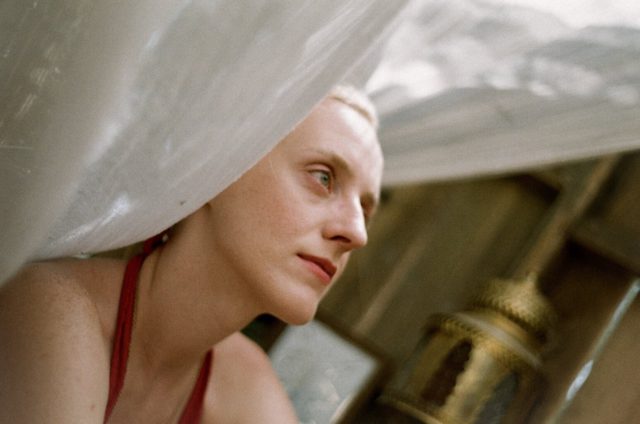Avsluta (Lucie Štěpánková) is a London-based Czech-born electro-acoustic composer, improviser and sound artist. A recent graduate from Sound Arts and Design bachelor programme at the London College of Communication and a great admirer of contemporary classical, experimental and dance music, her practice is a genre-fluid journey through deep listening situations, sonic abstractions, dream sequences and pulsing layers of ambiance. Her compositions are created through intertwining synthetic sonorities, field recordings and live and recorded acoustic free improvisation with objects and materials.
Your work is rooted in listening and its psychoacoustic properties. Has listening always been important to you?
Yes, I would say that listening has always played a vital part in what I do but my understanding of listening has transformed over time. In the early days, it was listening for pleasure without much active engagement. I would call that passive listening. Over the past few years, it became gradually more engaged, a creative activity in itself rather than passive exposure. I would call that active listening. Active listening plays an important part in my creative process. It is a kind of feedback loop where listening becomes the driving force of making new material.
Can you talk about “Phantom Field” – a sonic realm that you have incorporated into your work?
Phantom Field is a metaphysical concept which developed through my increasing engagement with free improvisation and has since occupied much of my practice. My understanding of the word ‘field’ is generous and includes not only physical spaces but also psychological realms. I like to think about my compositions and performances as sonic environments ready to be inhabited. The Phantom Field I talk about is this imaginary sonic space which gently challenges our experience of reality and invites mindful presence. Active listening is the entry point into this realm, a necessary contribution from the listener. I believe that the point of active listening is where the sound becomes music.
You are from the Czech Republic, but relocated to London where you studied Sound Arts. How have your studies influenced your work with sound and how do you view the London experimental music/arts community at the moment and its future outlook vis-a-vis Brexit?
My studies in London had a profound impact on my work. I moved from thinking about music to thinking about sound. It was a spectacular shift that opened up a whole new world of possibilities. It liberated and inspired me. I started working with more abstract concepts, like emotions or reality. For me, sound proved to be a fitting medium to explore these.
Community is the perfect word to describe the current experimental arts scene in London. I feel a strong tendency towards collectivity, mutual support, and inclusiveness. Collectives and underground venues are on the rise. Fresh energy is pulsing through the city. It is difficult to say what the future holds since there are very few facts to hold on to, but I think that the current political situation is one of the factors that bind this community together. As is often the case in times of political unrest, art is becoming a way of peaceful protest and offers alternatives to the mainstream currents of thought.
How do you structure your sound work? Space and expansive soundscapes seem to play an important role?
I rarely work towards a concrete idea. I let sounds unfold from emotions, memories of places, sometimes through reminiscing body movements. I compose mainly intuitively, experimenting with field recording modifications, analogue synthesis and improvised interaction with everyday objects. In terms of structure, I layer atmospheric soundscapes that are slowly evolving, devolving and shifting. These movements are patient, sometimes almost imperceptible. I like how moments flow into one another, defying perception of time. I think my work is more about space than it is about time. I like the idea of time becoming obsolete. Into this plateau of sound, I entwine synthetic melodic sequences and sonic incidents. Recently, I am very interested in incorporating vocal samples, short snippets of monologues and conversations taken out of context. I find these in films and documentaries which are one of my greatest inspirations.
Eastern Philosophies are one of your influences. How do they manifest in your work and which particular philosophies are you most interested by? What other influences and inspirations do you have?
Chinese Taoism and Japanese Aesthetics are two schools of thought that interest me the most. Tao teaches us patience, going with the flow, being present. All of these qualities are really important for me in my work and I am constantly trying to find new ways to translate these into my compositions and performances. Japanese Aesthetics values simplicity which is also one of the major concepts in my work. I believe that there is great potential for complexity in simple things but it requires a certain level of engagement to be able to perceive it. This comes back to the importance of active listening.
By Lucia Udvardyova
